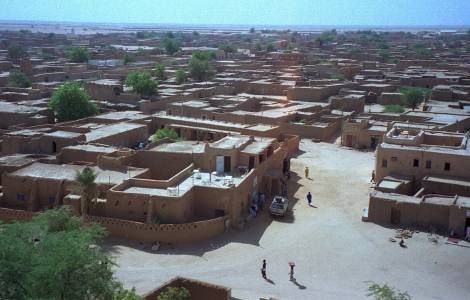AFRICA/NIGER – Concern about the possible reactivation of human trafficking in Agadez after the repeal of the law that classifies it as a crime
Niamey (Agenzia Fides) – “After the fall of Gaddafi, who had significant financial means to control the situation in the Sahel, Niger had become a key point of Western action in the region. However, after the fall of President Mohamed Bazoum, the country now seems to act more independently”, warns Rahmane Idrissa, researcher at Leiden University, to Fides. The military junta that took power in Niger with the July 26 coup, which deposed Bazoum (see Fides, 27/7/2023), announced the repeal of the law of May 26, 2015 that criminalized the illicit trafficking of migrants in Niger. “A law that was approved under pressure from the European Union”, recalls the Nigerian researcher. Migration routes through Niger are concentrated in the city of Agadez, which used to be a popular tourist destination. “About two decades ago, Agadez was a beautiful tourist resort visited by people from Europe. There were wonderful hotels, including an Italian one that offered excellent Italian cuisine,” Idrissa recalls. “The city’s role as a center for human trafficking diminished in 2015-16 after the European Union pressured Niger to pass a law that would criminalize the passage of migrants through Nigerien territory, due to the tragedies in the Mediterranean carried out by migrants” emphasizes the researcher. “Although this law did not completely stop human trafficking through Niger, it did manage to reduce it significantly compared to 2015,” says the Leiden University researcher. “I myself – continues the researcher – have been able to verify that, compared to the recent past, in Niamey there were fewer citizens of the coastal countries of West Africa waiting to undertake the journey that would take them to the Mediterranean coast through Agadez.” Despite this, Idrissa points out that the measure has not always benefited migrants: “It is important to note that, once in Agadez, migrants were prohibited from continuing their journey, which increased their danger. They were alone and had to learn to survive on their own. Subsequently, an attempt was made to repatriate them and, while they waited for repatriation, the International Organization for Migration (IOM) was in charge of their assistance.” The military junta’s repeal of the law has received severe criticism from the European Union. Ylva Johansson, European Commissioner for Home Affairs, has expressed deep concern about the repeal of the law, stating: “I deeply regret this decision. I am very worried about the situation. There is a great risk that this will cause more deaths in the desert; That is the most worrying point.” Johansson added that this would likely lead to more migrants heading to Libya and attempting to cross the Mediterranean to reach Europe. The European Union strongly condemned the seizure of power in Niger on July 26 by the military, who has kept President Mohamed Bazoum under arrest since then. After the coup, the EU has suspended its budget aid to Niger and ended all security cooperation. (L.M.) (Agenzia Fides, 29/11/2023)
Share:
Source link : http://www.fides.org/en/news/74456-AFRICA_NIGER_Concern_about_the_possible_reactivation_of_human_trafficking_in_Agadez_after_the_repeal_of_the_law_that_classifies_it_as_a_crime
Author :
Publish date : 2023-11-29 08:00:00
Copyright for syndicated content belongs to the linked Source.
